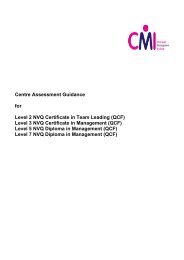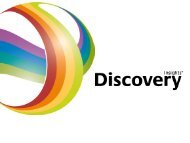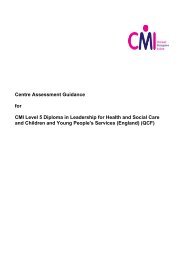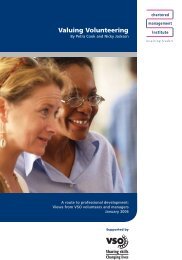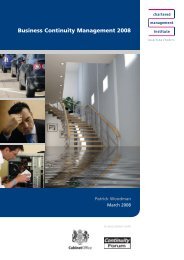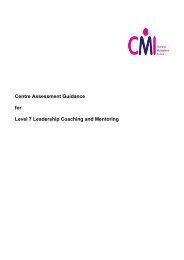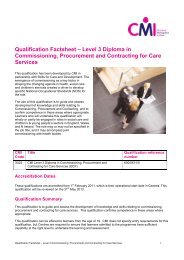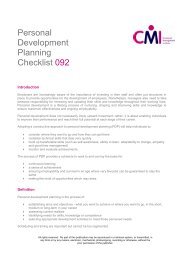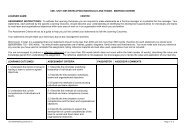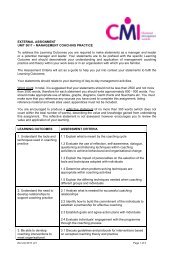Centre Assessment Guidance for CMI Level 3 Diploma in ...
Centre Assessment Guidance for CMI Level 3 Diploma in ...
Centre Assessment Guidance for CMI Level 3 Diploma in ...
Create successful ePaper yourself
Turn your PDF publications into a flip-book with our unique Google optimized e-Paper software.
<strong>Level</strong> 3 <strong>Diploma</strong> <strong>in</strong> Commission<strong>in</strong>g, Procurement and Contract<strong>in</strong>g <strong>Centre</strong> <strong>Assessment</strong> <strong>Guidance</strong>support the development of speech, languageand communication5. Understand the potential effects oftransitions on children and young people’sdevelopment.5.1 Expla<strong>in</strong> how different types of transitionscan affect children and young people’sdevelopment5.2 Evaluate the effect on children and youngpeople of hav<strong>in</strong>g positive relationships dur<strong>in</strong>gperiods of transitionAdditional In<strong>for</strong>mation about this unitUnit aim(s)Additional <strong>in</strong><strong>for</strong>mationThis unit provides knowledge andunderstand<strong>in</strong>g of how children and youngpeople from birth to 19 years develop, <strong>in</strong>clud<strong>in</strong>gunderp<strong>in</strong>n<strong>in</strong>g theoretical perspectives. It also<strong>in</strong>cludes actions taken when differences <strong>in</strong>development are identified and the potentialeffects of transitions on children and youngpeople’s development.1.1 Developmental aspects <strong>in</strong>clud<strong>in</strong>g:• Physical• Communication• <strong>in</strong>tellectual / cognitive• Social, emotional and behavioural• Moral2.1. Personal factors <strong>in</strong>clud<strong>in</strong>g:• health status• disability• sensory impairment• learn<strong>in</strong>g difficulties2.2. External factors <strong>in</strong>clud<strong>in</strong>g:• Poverty and deprivation• Family environment and background• Personal choices• Looked after/ care status• Education2.3. Theories of development <strong>in</strong>clud<strong>in</strong>g:• Cognitive (e.g. Piaget)• Psychoanalytic (e.g. Freud)• Humanist (e.g. Maslow)• Social Learn<strong>in</strong>g (e.g. Bandura)• Operant condition<strong>in</strong>g (e.g. Sk<strong>in</strong>ner)• Behaviourist (e.g. Watson)Frameworks to support development<strong>in</strong>clud<strong>in</strong>g:• Social pedagogy3.1. Methods of assess<strong>in</strong>g developmentneeds e.g.:• <strong>Assessment</strong> Framework/s• ObservationVersion 1 – Feb 11 Page 38 of 73



